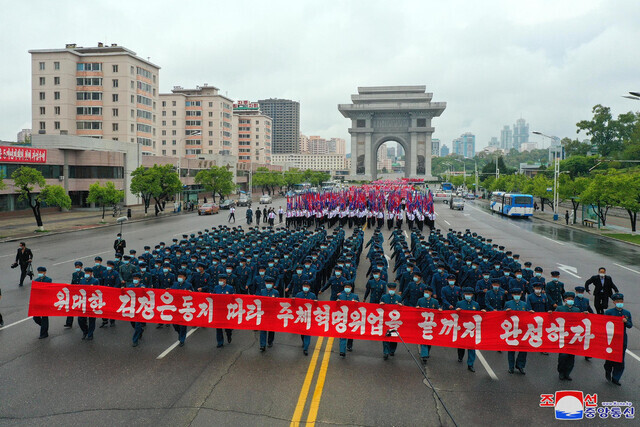hankyoreh
Links to other country sites 다른 나라 사이트 링크
[Editorial] Time for S. Korea, N. Korea, US to pursue conversation over confrontation

Conditions on the Korean Peninsula are growing more and more opaque. As soon as the Biden administration said it had concluded its review of North Korea policy, the North issued sharp criticism of the US. The North also threatened to “look into corresponding action” against South Korea because of propaganda leaflets reportedly launched by defector groups.
It would be worrisome if the US’s new North Korea policy failed to bring the North to the table for dialogue and instead served to raise military tensions. It’s time for South Korea, North Korea, and the US to dedicate their energy to resuming dialogue.
White House Press Secretary Jen Psaki said Friday that the Biden administration has finished its review of North Korea policy. US government officials told the media that the new policy will involve a practical and gradual approach, rather than the “grand bargain” of the Trump administration or the “strategic patience” of the Obama administration.
Despite the lack of focus on direct dialogue between leaders, that does sound quite a bit more flexible than the Trump administration’s refusal to lift any economic sanctions on the North unless it gave up its entire nuclear weapon program.
The US’s position might fall short of North Korea’s expectations. In a statement Sunday, the director general of the Department of US Affairs at North Korea’s Foreign Ministry said that “now that […] the keynote of the [US’] new DPRK policy has become clear, we will be compelled to press for corresponding measures.”
The North Korean leadership appears to have been provoked by the fact that the new policy didn’t make any clear mention of the North’s top priority of regime security and that the US State Department and Congress have publicly highlighted the North Korean human rights issue.
Even so, it’s rash for North Korea to slam the US in such a strident tone. Even if Pyongyang is only jockeying for the upper hand in future negotiations, such harsh remarks tend to damage mutual trust while pointlessly raising tensions.
Significantly, South Korean President Moon Jae-in and US President Joe Biden are scheduled to hold their first summit on May 21. With that in mind, the North ought to behave itself prudently as it waits for Seoul and Washington to coordinate their policy.
North Korea has promised “corresponding measures,” which makes it even more likely that the North will carry out a missile launch or some other show of force. It’s particularly troubling that Kim Yo-jong, younger sister of Kim Jong-un and vice department director of the Workers’ Party of Korea Central Committee, used a similar phrase — “corresponding action” — while castigating South Korea about defector groups that have reportedly launched balloons filled with propaganda leaflets.
Some predict that North Korea may carry out a show of force aimed at South Korea instead of targeting the US directly. But whatever form the provocation takes, it would only damage the cause of peace on the Korean Peninsula and have a negative impact on opening the door to dialogue.
During Moon and Biden’s summit on May 21, we hope the two leaders will come up with flexible and realistic ways to bring North Korea to the table for dialogue. One option would be for the US to send a message before negotiations begin that it won’t pursue artificial regime change.
Once again, the Korean Peninsula stands at a fork in the road. One way leads to military confrontation, and the other to dialogue and negotiations. South Korea, North Korea, and the US all must exercise restraint.
Please direct comments or questions to [english@hani.co.kr]

Editorial・opinion
![[Column] Season 2 of special prosecutor probe may be coming to Korea soon [Column] Season 2 of special prosecutor probe may be coming to Korea soon](https://flexible.img.hani.co.kr/flexible/normal/500/300/imgdb/original/2024/0426/3317141030699447.jpg) [Column] Season 2 of special prosecutor probe may be coming to Korea soon
[Column] Season 2 of special prosecutor probe may be coming to Korea soon![[Column] Park Geun-hye déjà vu in Yoon Suk-yeol [Column] Park Geun-hye déjà vu in Yoon Suk-yeol](https://flexible.img.hani.co.kr/flexible/normal/500/300/imgdb/original/2024/0424/651713945113788.jpg) [Column] Park Geun-hye déjà vu in Yoon Suk-yeol
[Column] Park Geun-hye déjà vu in Yoon Suk-yeol- [Editorial] New weight of N. Korea’s nuclear threats makes dialogue all the more urgent
- [Guest essay] The real reason Korea’s new right wants to dub Rhee a founding father
- [Column] ‘Choson’: Is it time we start referring to N. Korea in its own terms?
- [Editorial] Japan’s rewriting of history with Korea has gone too far
- [Column] The president’s questionable capacity for dialogue
- [Column] Are chaebol firms just pizza pies for families to divvy up as they please?
- [Column] Has Korea, too, crossed the Rubicon on China?
- [Correspondent’s column] In Japan’s alliance with US, echoes of its past alliances with UK
Most viewed articles
- 1AI is catching up with humans at a ‘shocking’ rate
- 2‘We must say no’: Seoul defense chief on Korean, USFK involvement in hypothetical Taiwan crisis
- 3[Column] Season 2 of special prosecutor probe may be coming to Korea soon
- 4Is Japan about to snatch control of Line messenger from Korea’s Naver?
- 5Korea sees more deaths than births for 52nd consecutive month in February
- 6Amnesty notes ‘erosion’ of freedom of expression in Korea in annual human rights report
- 7[Editorial] Korea’s surprise Q1 growth requires objective assessment, not blind fanfare
- 8Is N. Korea threatening to test nukes in response to possible new US-led sanctions body?
- 9Foreign workers live behind daunting language barrier
- 10Park administration’s distorted history textbooks made public